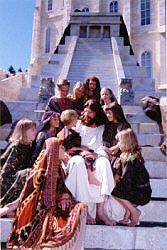As I mentioned recently on Flunking Sainthood, I had the opportunity earlier this month to be a guest on the Mormon Matters podcast with LDS blogger Joanna Brooks and evangelical pastor John Morehead, talking about theological differences between our religions. Here, John offers some further thoughts about evangelical-Mormon readers and holds out hope that some old approaches might be changing. –JKR

By John Morehead
In his book The Younger Evangelicals: Facing the Challenges of the New World (Baker, 2002), the late Robert E. Webber discussed the diversity of Protestant evangelicalism, and developments in this subculture’s religious landscape. He defined “younger evangelicals” to include anyone “who deals thoughtfully with the shift from 20th– to 21st-century culture.” These shifts involve different attitudes to theology, culture, and other religions. I include myself in this demographic (perhaps more by like-mindedness than age), and offer my thoughts on what this involves for evangelicals engaging Mormon culture.
Some of the reasons for my shift in praxis and thought come from personal experiences. After relocating to Utah from California I had the opportunity to attend the Mormon Miracle Pageant in Manti, Utah. The pageant itself was a fascinating drama. At the base of the Manti temple, Mormon actors recreated various segments of LDS history, complete with dramatic music, lighting, costumes, sets, and recorded narration. It is easy to understand how Mormons are moved emotionally and spiritually by this event.
An even greater spectacle came prior to the pageant when a handful of evangelicals gathered on public property just outside the temple grounds to engage the Mormon faithful. Nearby a few individuals handed out literature and engaged Mormons in doctrinal discussions. The crowds of curious and angry Mormons grew around a sign-wielding evangelical, and he used the opportunity to shout biblical doctrine and verses at the crowd, while describing LDS doctrine in the most unflattering terms possible. Eventually fellow evangelicals came alongside and joined in the spectacle, some shouting questions and Bible verses, while others quietly engaged Mormon onlookers in dialogue.
In contrast to these polemical encounters offered by what Webber would label as “traditional evangelicals,” there is another movement within evangelicalism that draws upon Webber’s “embodied” or “incarnational” form of ministry. This is defined as “an approach to Christian service based on principles derived from the life of Jesus in his relationships, both with those who followed him and those who rejected him” (Paul Hiebert & Eloise Hiebert Nenese, Incarnational Ministry [Baker, 1995]).
Incarnational ministry involves several important elements.
1. An emphasis upon relationships. An incarnational approach emphasizes cultural interaction, personal involvement, and long-term commitment. Jesus, Paul, and many in the history of Christian mission, recognized something we have forgotten: people are more receptive to what we have to say when it occurs within the context of relationships (as well as open Christian community) existing within their culture.
2. Theology and culture are taken seriously. Incarnational ministry recognizes the importance of sound theological reflection to ministry praxis, but it also recognizes other considerations, including the culture in which the gospel is proclaimed. Evangelicals who take culture and theology seriously, will also reflect on their character and actions as it relates to respecting (while not uncritically accepting) the culture in which they minister.
3. Rhetorical humility. The adoption of an embodied or incarnational ministry means evangelicals don’t have to communicate in ways that are culturally and personally offensive to Mormons in order to adequately proclaim their message. In fact, we may be causing needless offense and preventing our message from being heard through certain communication styles.
4. Humility in character. Here I am reminded of the words David Hesselgrave where he said “remember that although missionaries have been commanded by Christ to preach the gospel, they cannot command a hearing. They must win a hearing by demonstrating that they are people of integrity, credibility, and goodwill” (David Hesselgrave, Communicating Christ Cross-Culturally [Zondervan, 1991]. Evangelicals must ask themselves whether Mormon contacts see us as these kinds of people.
The purpose of this post is to describe a ministry form in evangelicalism. I hope that these ideas will become the stuff of reflection and discussion by evangelicals. I offer my thanks to Jana Riess for providing me with this space for writing, and to Mormon readers for their patience as they “listen in” on an evangelical intra-religious dialogue with inter-religious implications.
John Morehead is Director of the Western Institute for Intercultural Studies, and involved with the Evangelical Chapter of the Foundation for Religious Diplomacy.

